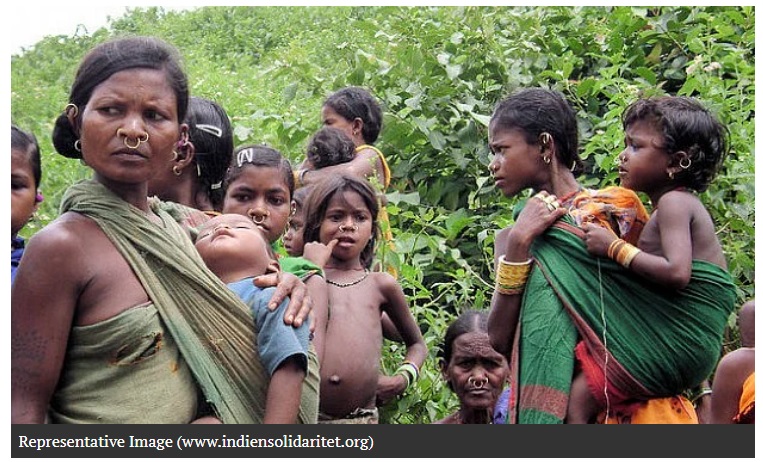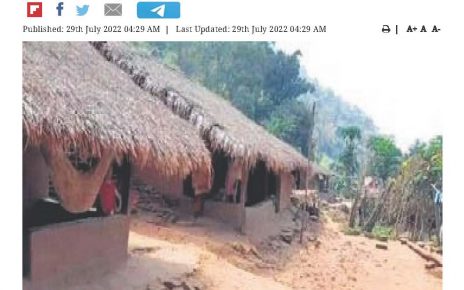On 12 May 2025, the UN Committee on Elimination of Racial Discrimination (CERD) intervened under its “Early Warning” procedure for intervention with the Government of India against summary relocation/forceful eviction of about 89,800 tribal and forest dwelling families or about 450,000 persons from 54 tiger reserves in 18 states vide order dated 19 June 2024 of the National Tiger Conservation Authority (NTCA) in violations of the Wildlife Protection Act, 1972 and the Forest Rights Act of 2006.
The CERD Committee noted that the order violates the safeguards and standards of the domestic legal framework, namely under Section 38V(5) of the Wildlife Protection Act of 1972 and Section 4(2) of the Scheduled Tribes and Other Traditional Forest Dwellers (Recognition of Forest Rights) Act of 2006, particularly regarding the incomplete process to recognize and determine the rights and acquisition of land of the tribal and forest-dwelling Indigenous Peoples, the lack of evidence that the activities or the presence of the tribal and Indigenous Peoples cause irreversible damage and threaten the existence of tigers and their habitat, the absence of confirmation that other reasonable options of co-existence are not available, and lack of available resettlement or alternative packages to impacted Indigenous communities.
The CERD Committee expressed concerned that the allegations regarding the order issued by National Tiger Conservation Authority, if verified, would infringe rights protected of the tribal and forest-dwelling Indigenous Peoples under the International Convention on the Elimination of All Forms of Racial Discrimination (ICERD). Specifically, the CERD Committee expressed concerns about the reported lack of effective and meaningful consultation with the tribal and forest-dwelling Indigenous Peoples to obtain their free, prior and informed consent; the lack of impact assessment study in relation to the order and its impact on the tribal and forest-dwelling Indigenous Peoples; the reported risk of displacement and forced eviction of the tribal and forest-dwelling Indigenous Peoples as result of implementing this order, the lack of provided adequate alternative housing and compensation for the lands, territories and resources that they have traditionally owned or used.
DIRECTIONS FOR EVICTION BY THE NCTA:
On 19 June 2024, the National Tiger Conservation Authority (NTCA) issued an order directing the Chief Wildlife Wardens of the 18 States to carry out relocation/forceful eviction of about 89,800 tribal and forest dwelling families from Critical Tiger Habitats (CTHs) or core areas of 54 tiger reserves in 19 states on a “priority basis”. These 18 states are: Andhra Pradesh, Arunachal Pradesh, Assam, Bihar, Chhattisgarh, Jharkhand, Karnataka, Kerala, Madhya Pradesh, Maharashtra, Mizoram, Odisha, Rajasthan, Tamil Nadu, Telangana, Uttar Pradesh, Uttarakhand and West Bengal. The NCTA stated that “The progress of village relocation is very slow, and it poses grave concern in light of tiger conservation. It will be highly appreciated if the issue of village relocation may be taken up on priority basis and timeline may be framed for smooth relocation of the villages from the core/critical tiger habitat areas”.
VIOLATIONS OF NATIONAL LAWS DURING FORCED EVICTIONS:
Forced evictions often violate the guarantees provided under the Wildlife Protection Act, 1972 and the Forest Rights Act of 2006 as explained below.
I. Violations of Section 38V(5)(iii) of the Wildlife Protection Act, 1972
Section 38V(5)(iii) of the Wildlife Protection Act, 1972 provides the following guarantees with respect to relocation and displacement from the Tiger Reserves:
“(5) Save as for voluntary relocation on mutually agreed terms and conditions, provided that such terms and conditions satisfy the requirements laid down in this sub-section, no Scheduled Tribes or other forest dwellers shall be resettled or have their rights adversely affected for the purpose of creating inviolate areas for tiger conservation unless—
(i) the process of recognition and determination of rights and acquisition of land or forest rights of the Scheduled Tribes and such other forest dwelling persons is complete;
(ii) the concerned agencies of the State Government, in exercise of their powers under this Act, establishes with the consent of the Scheduled Tribes and such other forest dwellers in the area, and in consultation with an ecological and social scientist familiar with the area, that the activities of the Scheduled Tribes and other forest dwellers or the impact of their presence upon wild animals is sufficient to cause irreversible damage and shall threaten the existence of tigers and their habitat;
(iii) the State Government, after obtaining the consent of the Scheduled Tribes and other forest dwellers inhabiting the area, and in consultation with an independent ecological and social scientist familiar with the area, has come to a conclusion that other reasonable options of co-existence, are not available;
(iv) resettlement or alternative package has been prepared providing for livelihood for the affected individuals and communities and fulfils the requirements given in the National Relief and Rehabilitation Policy;
(v) the informed consent of the Gram Sabha concerned, and of the persons affected, to the resettlement programme has been obtained; and
(vi) the facilities and land allocation at the resettlement location are provided under the said programme, otherwise their existing rights shall not be interfered with.”
Non Compliance with Section 38V(5)(iii) of the WPA
Each of these provisions of Section 38V(5)(iii) of the Wildlife Protection Act, 1972 has not been fulfilled as on date by the NTCA and the Chief Wildlife Wardens as described below:
(i) the process of recognition and determination of rights and acquisition of land or forest rights of the Scheduled Tribes and such other forest dwelling persons has not been completed in these Tiger Reserves;
(ii) the concerned agencies of the State Government have not established with the consent of the Scheduled Tribes and such other forest dwellers in the area, and in consultation with an ecological and social scientist familiar with the area, that the activities of the Scheduled Tribes and other forest dwellers or the impact of their presence upon wild animals is sufficient to cause irreversible damage and shall threaten the existence of tigers and their habitat;
(iii) the State Government, after obtaining the consent of the Scheduled Tribes and other forest dwellers inhabiting the area, and in consultation with an independent ecological and social scientist familiar with the area, has not come to a conclusion that other reasonable options of co-existence, are not available;
(iv) resettlement or alternative package has not been prepared providing for livelihood for the affected individuals and communities as per the Right to Fair Compensation and Transparency in Land Acquisition, Rehabilitation and Resettlement Act, 2013;
(v) the informed consent of all the Gram Sabhas under each Tiger Reserve concerned, and of the persons affected, to the resettlement programme has not been obtained; and
(vi) the land allocations at the resettlement location have not been earmarked as yet, facilities have not been established and therefore, the relocation could not be carried out in most cases as on date!
The NTCA effectively issued the impugned order dated 19 June 2024 directing effective involuntary relocation because of the statutory non-compliance under the Wild Life Protection Act.
II. Violations of Section 4 (2) of the Forest Rights Act, 2006
The order of the NCTA further violations Section 4(2) of the Scheduled Tribes and Other Traditional Forest Dwellers (Recognition of Forest Rights) Act, 2006 which outlines the rights and procedure to be adopted for displacement under the Wildlife Protection Act, 1972 as given below:
“4. Recognition of, and vesting of, forest rights in forest dwelling Scheduled Tribes and other traditional forest dwellers.–
(1)….
(2) The forest rights recognised under this Act in critical wildlife habitats of National Parks and Sanctuaries may subsequently be modified or resettled, provided that no forest rights holders shall be resettled or have their rights in any manner affected for the purposes of creating inviolate areas for wildlife conservation except in case all the following conditions are satisfied, namely:–
(a) the process of recognition and vesting of rights as specified in section 6 is complete in all the areas under consideration;
(b) it has been established by the concerned agencies of the State Government, in exercise of their powers under the Wild Life (Protection) Act, 1972 (53 of 1972) that the activities or impact of the presence of holders of rights upon wild animals is sufficient to cause irreversible damage and threaten the existence of said species and their habitat;
(c) the State Government has concluded that other reasonable options, such as, co-existence are not available;
(d) a resettlement or alternatives package has been prepared and communicated that provides a secure livelihood for the affected individuals and communities and fulfils the requirements of such affected individuals and communities given in the relevant laws and the policy of the Central Government;
(e) the free informed consent of the Gram Sabhas in the areas concerned to the proposed resettlement and to the package has been obtained in writing;
(f) no resettlement shall take place until facilities and land allocation at the resettlement location are complete as per the promised package;
Provided that the critical wildlife habitats from which rights holders are thus relocated for purposes of wildlife conservation shall not be subsequently diverted by the State Government or the Central Government or any other entity for other uses.
The diversion of tribal lands acquired for purposes of wildlife conservation shall not by the State Government or the Central Government or other entities are widespread.
The forcible relocation is being carried out despite the fact both the Wildlife Protection Act, 1972 and the Forest Rights Act, 2006 use the term “shall” and “non-obstante” clauses reiterating mandatory compliance with Section 38V (5)(iii) of the Wildlife Protection Act and Section 4(2) of the Forest Rights Act. Non-compliance with these laws is not an option that the NTCA and the Chief Wildlife Wardens of the 18 States have. The authorities are required to mandatorily comply with these provisions. The rights and livelihoods of the Scheduled Tribes and other forest dwelling communities guaranteed under the statutory laws cannot be violated under any circumstances.
INTERVENTIONS OF THE NATIONAL COMMISSION FOR SCHEDULED TRIBES:
In November 2024, the National Commission for Scheduled Tribes decided to set up a committee to verify whether states are adhering to all required guidelines while relocating tribal communities from India’s tiger reserve areas. The Commission had taken cognizance of the National Tiger Conservation Authority’s (NTCA) June 19 directive, which instructed forest officials to expedite the relocation of 64,801 families from 591 villages in the core areas of 54 tiger reserves.
Indigenous peoples have been residing in the core areas in harmony with nature and forests for generations and their livelihoods, culture, and traditions are deeply connected to the forest ecosystem. Under the Forest Rights Act (FRA) 2006, these communities are granted individual and community rights to access, manage and use forest resources, as well as live in these forests. However, they argue that the “contentious” and “delayed” implementation of FRA has left them vulnerable to forced eviction.
The CERD Committee asked India to submit its reply by 8 August 2025.




